Review: Authentic Leadership, LMX, and Employee Psychological Capital
VerifiedAdded on 2021/12/07
|7
|2507
|146
Literature Review
AI Summary
This literature review explores the intricate relationships between authentic leadership, leader-member exchange (LMX), and employee psychological capital, highlighting their combined impact on overall employee performance and organizational success. It delves into how authentic leaders, characterized by integrity and consideration for their employees' needs, foster a positive environment that enhances psychological capital—hope, efficacy, resilience, and optimism—within the workforce. The review further examines how positive leader-member exchanges, built on trust and mutual respect, mediate the relationship between leadership style and employee outcomes, particularly in challenging situations. By analyzing various studies, the review concludes that authentic leadership and strong LMX are crucial for motivating employees, building loyalty, and ultimately driving improved performance and organizational effectiveness, emphasizing the importance of leaders cultivating these qualities and engaging in effective communication with their teams.

30 November 2018
The Positive Leader
The Positive Leader
Paraphrase This Document
Need a fresh take? Get an instant paraphrase of this document with our AI Paraphraser
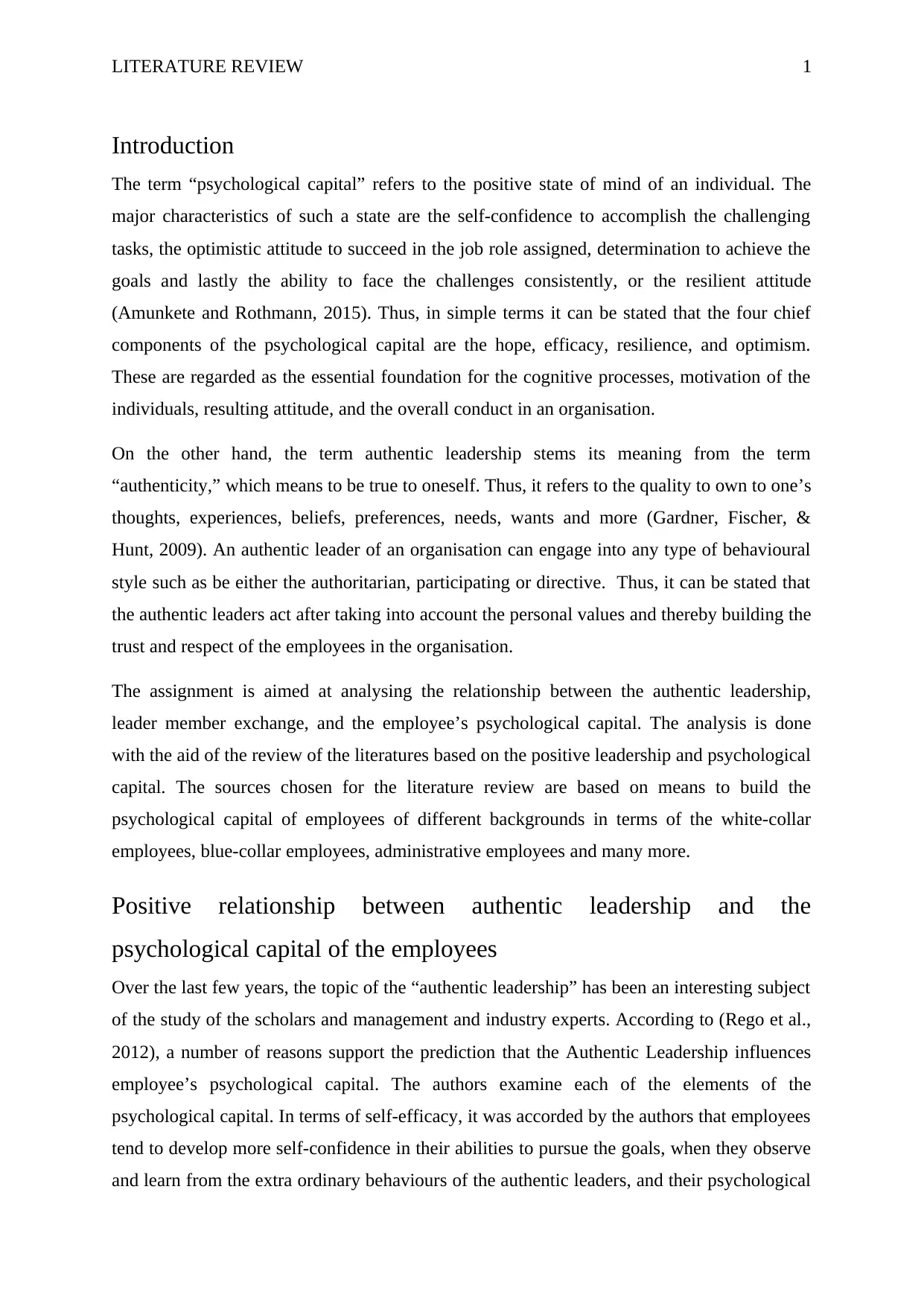
LITERATURE REVIEW 1
Introduction
The term “psychological capital” refers to the positive state of mind of an individual. The
major characteristics of such a state are the self-confidence to accomplish the challenging
tasks, the optimistic attitude to succeed in the job role assigned, determination to achieve the
goals and lastly the ability to face the challenges consistently, or the resilient attitude
(Amunkete and Rothmann, 2015). Thus, in simple terms it can be stated that the four chief
components of the psychological capital are the hope, efficacy, resilience, and optimism.
These are regarded as the essential foundation for the cognitive processes, motivation of the
individuals, resulting attitude, and the overall conduct in an organisation.
On the other hand, the term authentic leadership stems its meaning from the term
“authenticity,” which means to be true to oneself. Thus, it refers to the quality to own to one’s
thoughts, experiences, beliefs, preferences, needs, wants and more (Gardner, Fischer, &
Hunt, 2009). An authentic leader of an organisation can engage into any type of behavioural
style such as be either the authoritarian, participating or directive. Thus, it can be stated that
the authentic leaders act after taking into account the personal values and thereby building the
trust and respect of the employees in the organisation.
The assignment is aimed at analysing the relationship between the authentic leadership,
leader member exchange, and the employee’s psychological capital. The analysis is done
with the aid of the review of the literatures based on the positive leadership and psychological
capital. The sources chosen for the literature review are based on means to build the
psychological capital of employees of different backgrounds in terms of the white-collar
employees, blue-collar employees, administrative employees and many more.
Positive relationship between authentic leadership and the
psychological capital of the employees
Over the last few years, the topic of the “authentic leadership” has been an interesting subject
of the study of the scholars and management and industry experts. According to (Rego et al.,
2012), a number of reasons support the prediction that the Authentic Leadership influences
employee’s psychological capital. The authors examine each of the elements of the
psychological capital. In terms of self-efficacy, it was accorded by the authors that employees
tend to develop more self-confidence in their abilities to pursue the goals, when they observe
and learn from the extra ordinary behaviours of the authentic leaders, and their psychological
Introduction
The term “psychological capital” refers to the positive state of mind of an individual. The
major characteristics of such a state are the self-confidence to accomplish the challenging
tasks, the optimistic attitude to succeed in the job role assigned, determination to achieve the
goals and lastly the ability to face the challenges consistently, or the resilient attitude
(Amunkete and Rothmann, 2015). Thus, in simple terms it can be stated that the four chief
components of the psychological capital are the hope, efficacy, resilience, and optimism.
These are regarded as the essential foundation for the cognitive processes, motivation of the
individuals, resulting attitude, and the overall conduct in an organisation.
On the other hand, the term authentic leadership stems its meaning from the term
“authenticity,” which means to be true to oneself. Thus, it refers to the quality to own to one’s
thoughts, experiences, beliefs, preferences, needs, wants and more (Gardner, Fischer, &
Hunt, 2009). An authentic leader of an organisation can engage into any type of behavioural
style such as be either the authoritarian, participating or directive. Thus, it can be stated that
the authentic leaders act after taking into account the personal values and thereby building the
trust and respect of the employees in the organisation.
The assignment is aimed at analysing the relationship between the authentic leadership,
leader member exchange, and the employee’s psychological capital. The analysis is done
with the aid of the review of the literatures based on the positive leadership and psychological
capital. The sources chosen for the literature review are based on means to build the
psychological capital of employees of different backgrounds in terms of the white-collar
employees, blue-collar employees, administrative employees and many more.
Positive relationship between authentic leadership and the
psychological capital of the employees
Over the last few years, the topic of the “authentic leadership” has been an interesting subject
of the study of the scholars and management and industry experts. According to (Rego et al.,
2012), a number of reasons support the prediction that the Authentic Leadership influences
employee’s psychological capital. The authors examine each of the elements of the
psychological capital. In terms of self-efficacy, it was accorded by the authors that employees
tend to develop more self-confidence in their abilities to pursue the goals, when they observe
and learn from the extra ordinary behaviours of the authentic leaders, and their psychological
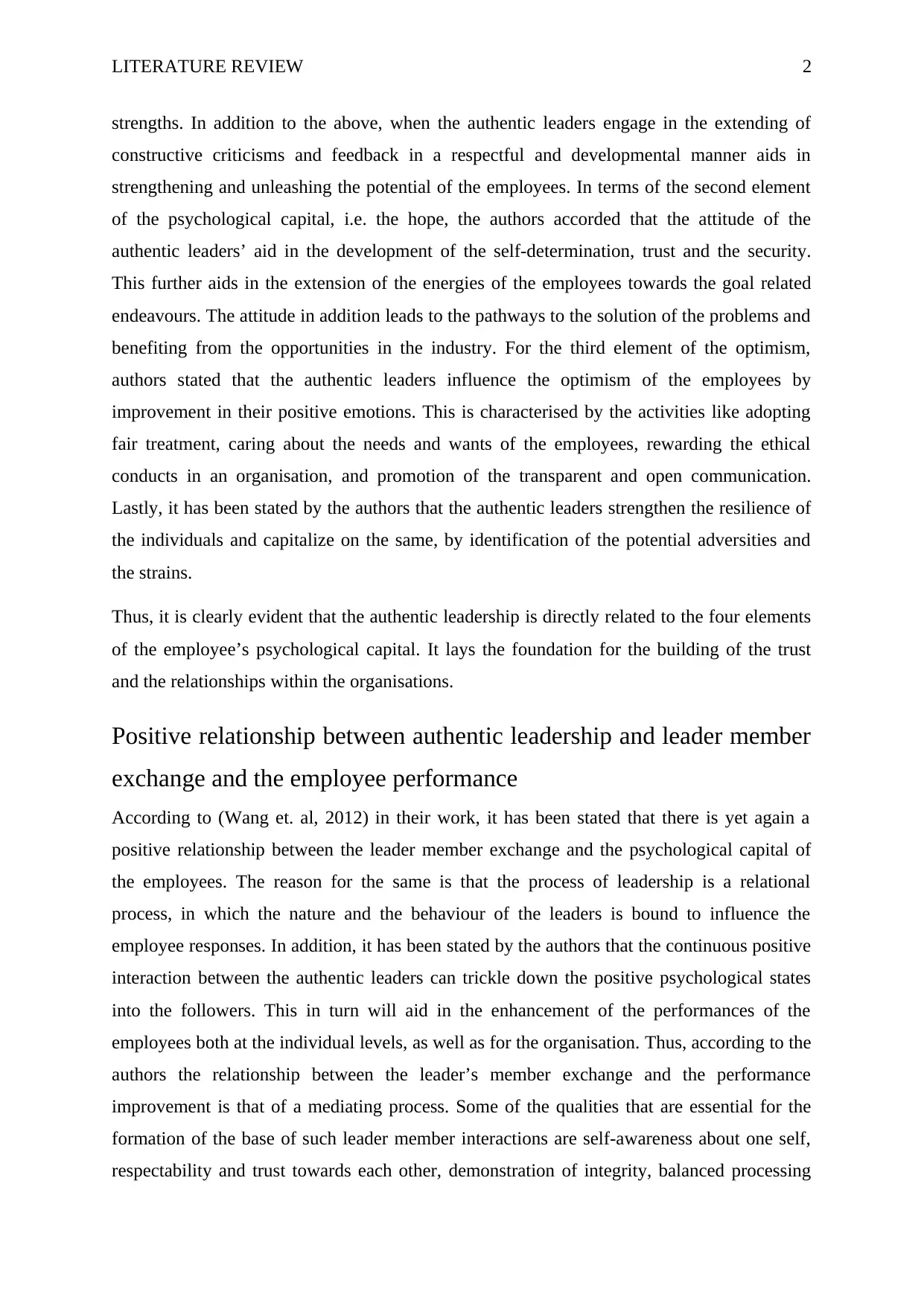
LITERATURE REVIEW 2
strengths. In addition to the above, when the authentic leaders engage in the extending of
constructive criticisms and feedback in a respectful and developmental manner aids in
strengthening and unleashing the potential of the employees. In terms of the second element
of the psychological capital, i.e. the hope, the authors accorded that the attitude of the
authentic leaders’ aid in the development of the self-determination, trust and the security.
This further aids in the extension of the energies of the employees towards the goal related
endeavours. The attitude in addition leads to the pathways to the solution of the problems and
benefiting from the opportunities in the industry. For the third element of the optimism,
authors stated that the authentic leaders influence the optimism of the employees by
improvement in their positive emotions. This is characterised by the activities like adopting
fair treatment, caring about the needs and wants of the employees, rewarding the ethical
conducts in an organisation, and promotion of the transparent and open communication.
Lastly, it has been stated by the authors that the authentic leaders strengthen the resilience of
the individuals and capitalize on the same, by identification of the potential adversities and
the strains.
Thus, it is clearly evident that the authentic leadership is directly related to the four elements
of the employee’s psychological capital. It lays the foundation for the building of the trust
and the relationships within the organisations.
Positive relationship between authentic leadership and leader member
exchange and the employee performance
According to (Wang et. al, 2012) in their work, it has been stated that there is yet again a
positive relationship between the leader member exchange and the psychological capital of
the employees. The reason for the same is that the process of leadership is a relational
process, in which the nature and the behaviour of the leaders is bound to influence the
employee responses. In addition, it has been stated by the authors that the continuous positive
interaction between the authentic leaders can trickle down the positive psychological states
into the followers. This in turn will aid in the enhancement of the performances of the
employees both at the individual levels, as well as for the organisation. Thus, according to the
authors the relationship between the leader’s member exchange and the performance
improvement is that of a mediating process. Some of the qualities that are essential for the
formation of the base of such leader member interactions are self-awareness about one self,
respectability and trust towards each other, demonstration of integrity, balanced processing
strengths. In addition to the above, when the authentic leaders engage in the extending of
constructive criticisms and feedback in a respectful and developmental manner aids in
strengthening and unleashing the potential of the employees. In terms of the second element
of the psychological capital, i.e. the hope, the authors accorded that the attitude of the
authentic leaders’ aid in the development of the self-determination, trust and the security.
This further aids in the extension of the energies of the employees towards the goal related
endeavours. The attitude in addition leads to the pathways to the solution of the problems and
benefiting from the opportunities in the industry. For the third element of the optimism,
authors stated that the authentic leaders influence the optimism of the employees by
improvement in their positive emotions. This is characterised by the activities like adopting
fair treatment, caring about the needs and wants of the employees, rewarding the ethical
conducts in an organisation, and promotion of the transparent and open communication.
Lastly, it has been stated by the authors that the authentic leaders strengthen the resilience of
the individuals and capitalize on the same, by identification of the potential adversities and
the strains.
Thus, it is clearly evident that the authentic leadership is directly related to the four elements
of the employee’s psychological capital. It lays the foundation for the building of the trust
and the relationships within the organisations.
Positive relationship between authentic leadership and leader member
exchange and the employee performance
According to (Wang et. al, 2012) in their work, it has been stated that there is yet again a
positive relationship between the leader member exchange and the psychological capital of
the employees. The reason for the same is that the process of leadership is a relational
process, in which the nature and the behaviour of the leaders is bound to influence the
employee responses. In addition, it has been stated by the authors that the continuous positive
interaction between the authentic leaders can trickle down the positive psychological states
into the followers. This in turn will aid in the enhancement of the performances of the
employees both at the individual levels, as well as for the organisation. Thus, according to the
authors the relationship between the leader’s member exchange and the performance
improvement is that of a mediating process. Some of the qualities that are essential for the
formation of the base of such leader member interactions are self-awareness about one self,
respectability and trust towards each other, demonstration of integrity, balanced processing
⊘ This is a preview!⊘
Do you want full access?
Subscribe today to unlock all pages.

Trusted by 1+ million students worldwide
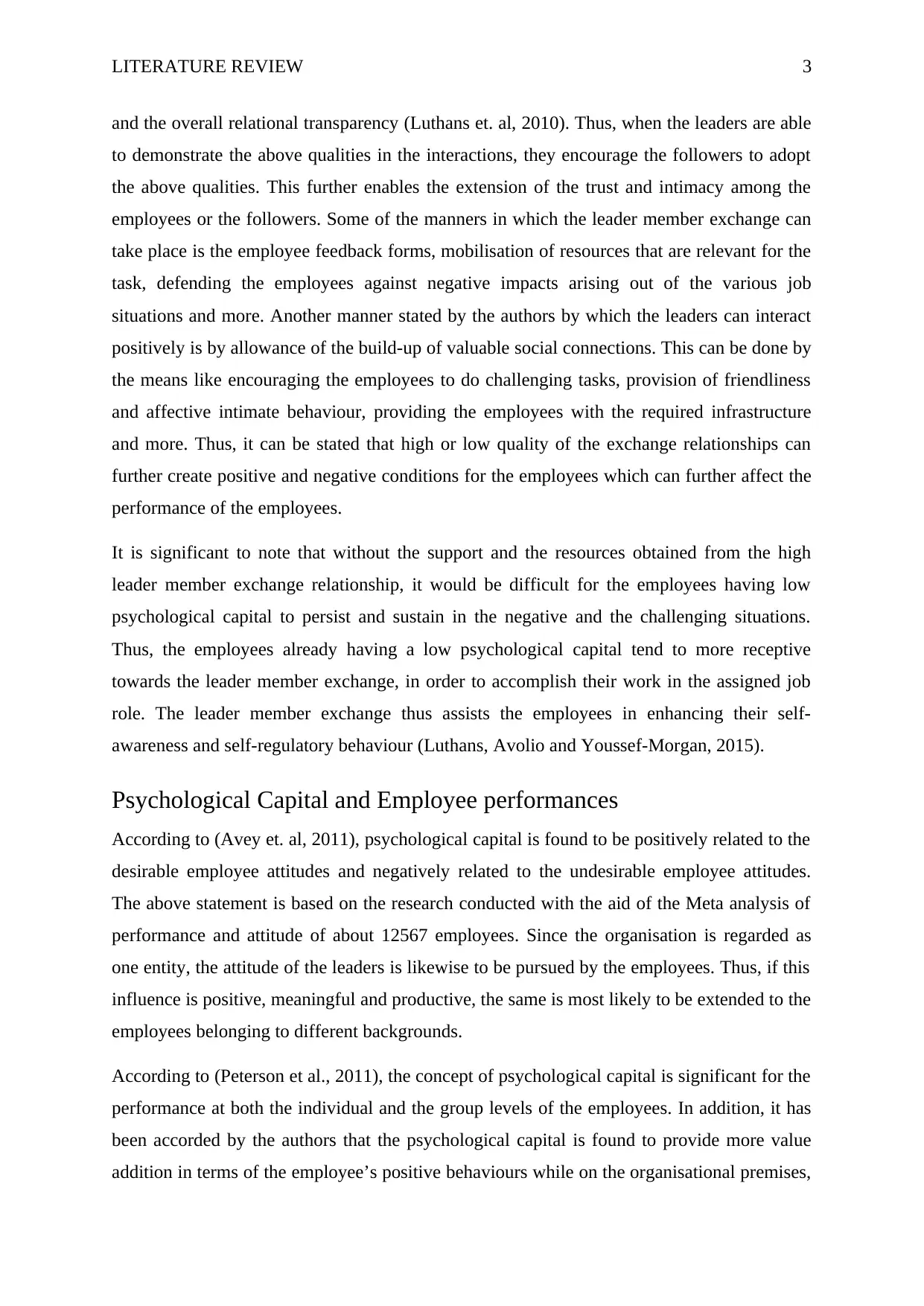
LITERATURE REVIEW 3
and the overall relational transparency (Luthans et. al, 2010). Thus, when the leaders are able
to demonstrate the above qualities in the interactions, they encourage the followers to adopt
the above qualities. This further enables the extension of the trust and intimacy among the
employees or the followers. Some of the manners in which the leader member exchange can
take place is the employee feedback forms, mobilisation of resources that are relevant for the
task, defending the employees against negative impacts arising out of the various job
situations and more. Another manner stated by the authors by which the leaders can interact
positively is by allowance of the build-up of valuable social connections. This can be done by
the means like encouraging the employees to do challenging tasks, provision of friendliness
and affective intimate behaviour, providing the employees with the required infrastructure
and more. Thus, it can be stated that high or low quality of the exchange relationships can
further create positive and negative conditions for the employees which can further affect the
performance of the employees.
It is significant to note that without the support and the resources obtained from the high
leader member exchange relationship, it would be difficult for the employees having low
psychological capital to persist and sustain in the negative and the challenging situations.
Thus, the employees already having a low psychological capital tend to more receptive
towards the leader member exchange, in order to accomplish their work in the assigned job
role. The leader member exchange thus assists the employees in enhancing their self-
awareness and self-regulatory behaviour (Luthans, Avolio and Youssef-Morgan, 2015).
Psychological Capital and Employee performances
According to (Avey et. al, 2011), psychological capital is found to be positively related to the
desirable employee attitudes and negatively related to the undesirable employee attitudes.
The above statement is based on the research conducted with the aid of the Meta analysis of
performance and attitude of about 12567 employees. Since the organisation is regarded as
one entity, the attitude of the leaders is likewise to be pursued by the employees. Thus, if this
influence is positive, meaningful and productive, the same is most likely to be extended to the
employees belonging to different backgrounds.
According to (Peterson et al., 2011), the concept of psychological capital is significant for the
performance at both the individual and the group levels of the employees. In addition, it has
been accorded by the authors that the psychological capital is found to provide more value
addition in terms of the employee’s positive behaviours while on the organisational premises,
and the overall relational transparency (Luthans et. al, 2010). Thus, when the leaders are able
to demonstrate the above qualities in the interactions, they encourage the followers to adopt
the above qualities. This further enables the extension of the trust and intimacy among the
employees or the followers. Some of the manners in which the leader member exchange can
take place is the employee feedback forms, mobilisation of resources that are relevant for the
task, defending the employees against negative impacts arising out of the various job
situations and more. Another manner stated by the authors by which the leaders can interact
positively is by allowance of the build-up of valuable social connections. This can be done by
the means like encouraging the employees to do challenging tasks, provision of friendliness
and affective intimate behaviour, providing the employees with the required infrastructure
and more. Thus, it can be stated that high or low quality of the exchange relationships can
further create positive and negative conditions for the employees which can further affect the
performance of the employees.
It is significant to note that without the support and the resources obtained from the high
leader member exchange relationship, it would be difficult for the employees having low
psychological capital to persist and sustain in the negative and the challenging situations.
Thus, the employees already having a low psychological capital tend to more receptive
towards the leader member exchange, in order to accomplish their work in the assigned job
role. The leader member exchange thus assists the employees in enhancing their self-
awareness and self-regulatory behaviour (Luthans, Avolio and Youssef-Morgan, 2015).
Psychological Capital and Employee performances
According to (Avey et. al, 2011), psychological capital is found to be positively related to the
desirable employee attitudes and negatively related to the undesirable employee attitudes.
The above statement is based on the research conducted with the aid of the Meta analysis of
performance and attitude of about 12567 employees. Since the organisation is regarded as
one entity, the attitude of the leaders is likewise to be pursued by the employees. Thus, if this
influence is positive, meaningful and productive, the same is most likely to be extended to the
employees belonging to different backgrounds.
According to (Peterson et al., 2011), the concept of psychological capital is significant for the
performance at both the individual and the group levels of the employees. In addition, it has
been accorded by the authors that the psychological capital is found to provide more value
addition in terms of the employee’s positive behaviours while on the organisational premises,
Paraphrase This Document
Need a fresh take? Get an instant paraphrase of this document with our AI Paraphraser
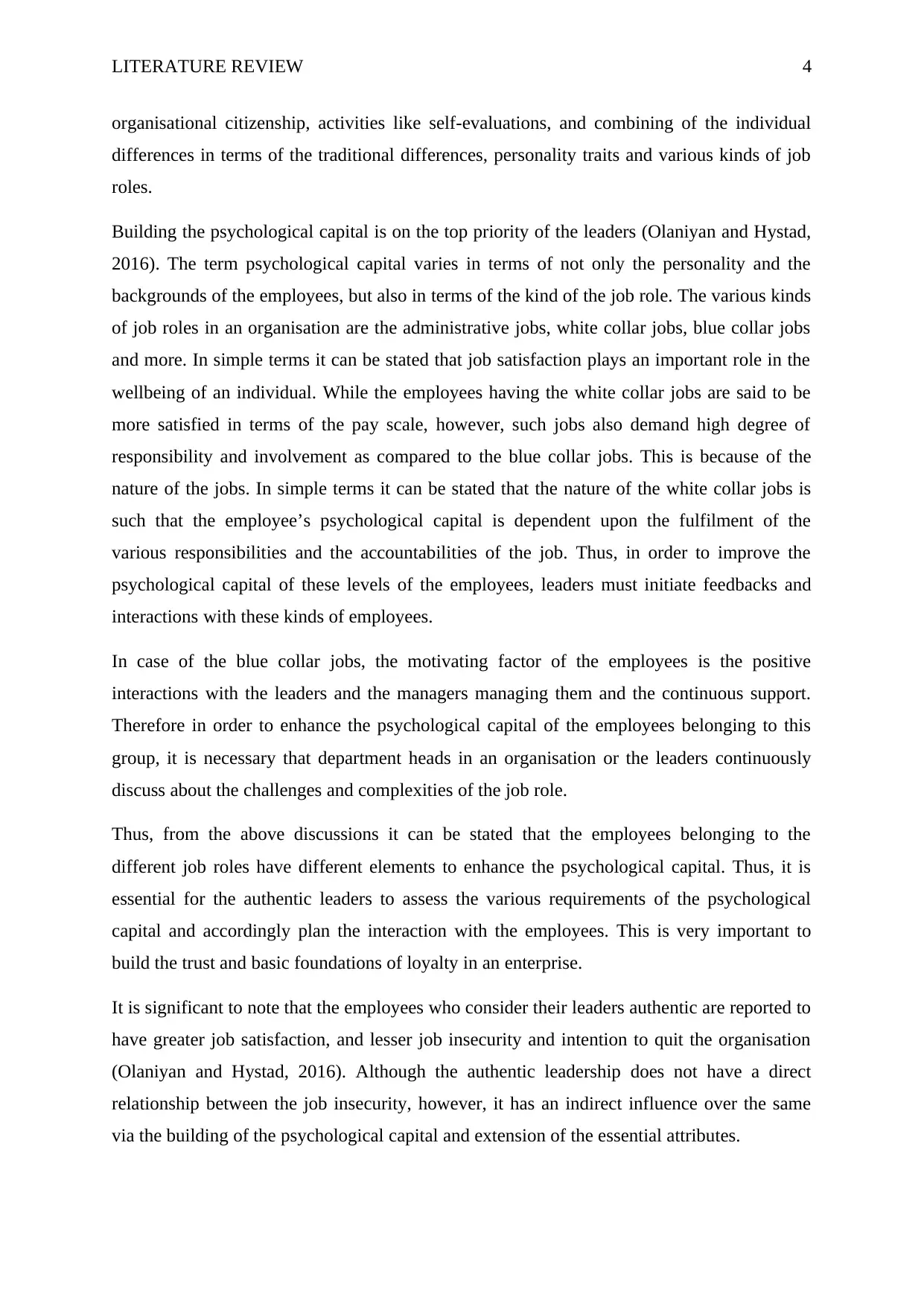
LITERATURE REVIEW 4
organisational citizenship, activities like self-evaluations, and combining of the individual
differences in terms of the traditional differences, personality traits and various kinds of job
roles.
Building the psychological capital is on the top priority of the leaders (Olaniyan and Hystad,
2016). The term psychological capital varies in terms of not only the personality and the
backgrounds of the employees, but also in terms of the kind of the job role. The various kinds
of job roles in an organisation are the administrative jobs, white collar jobs, blue collar jobs
and more. In simple terms it can be stated that job satisfaction plays an important role in the
wellbeing of an individual. While the employees having the white collar jobs are said to be
more satisfied in terms of the pay scale, however, such jobs also demand high degree of
responsibility and involvement as compared to the blue collar jobs. This is because of the
nature of the jobs. In simple terms it can be stated that the nature of the white collar jobs is
such that the employee’s psychological capital is dependent upon the fulfilment of the
various responsibilities and the accountabilities of the job. Thus, in order to improve the
psychological capital of these levels of the employees, leaders must initiate feedbacks and
interactions with these kinds of employees.
In case of the blue collar jobs, the motivating factor of the employees is the positive
interactions with the leaders and the managers managing them and the continuous support.
Therefore in order to enhance the psychological capital of the employees belonging to this
group, it is necessary that department heads in an organisation or the leaders continuously
discuss about the challenges and complexities of the job role.
Thus, from the above discussions it can be stated that the employees belonging to the
different job roles have different elements to enhance the psychological capital. Thus, it is
essential for the authentic leaders to assess the various requirements of the psychological
capital and accordingly plan the interaction with the employees. This is very important to
build the trust and basic foundations of loyalty in an enterprise.
It is significant to note that the employees who consider their leaders authentic are reported to
have greater job satisfaction, and lesser job insecurity and intention to quit the organisation
(Olaniyan and Hystad, 2016). Although the authentic leadership does not have a direct
relationship between the job insecurity, however, it has an indirect influence over the same
via the building of the psychological capital and extension of the essential attributes.
organisational citizenship, activities like self-evaluations, and combining of the individual
differences in terms of the traditional differences, personality traits and various kinds of job
roles.
Building the psychological capital is on the top priority of the leaders (Olaniyan and Hystad,
2016). The term psychological capital varies in terms of not only the personality and the
backgrounds of the employees, but also in terms of the kind of the job role. The various kinds
of job roles in an organisation are the administrative jobs, white collar jobs, blue collar jobs
and more. In simple terms it can be stated that job satisfaction plays an important role in the
wellbeing of an individual. While the employees having the white collar jobs are said to be
more satisfied in terms of the pay scale, however, such jobs also demand high degree of
responsibility and involvement as compared to the blue collar jobs. This is because of the
nature of the jobs. In simple terms it can be stated that the nature of the white collar jobs is
such that the employee’s psychological capital is dependent upon the fulfilment of the
various responsibilities and the accountabilities of the job. Thus, in order to improve the
psychological capital of these levels of the employees, leaders must initiate feedbacks and
interactions with these kinds of employees.
In case of the blue collar jobs, the motivating factor of the employees is the positive
interactions with the leaders and the managers managing them and the continuous support.
Therefore in order to enhance the psychological capital of the employees belonging to this
group, it is necessary that department heads in an organisation or the leaders continuously
discuss about the challenges and complexities of the job role.
Thus, from the above discussions it can be stated that the employees belonging to the
different job roles have different elements to enhance the psychological capital. Thus, it is
essential for the authentic leaders to assess the various requirements of the psychological
capital and accordingly plan the interaction with the employees. This is very important to
build the trust and basic foundations of loyalty in an enterprise.
It is significant to note that the employees who consider their leaders authentic are reported to
have greater job satisfaction, and lesser job insecurity and intention to quit the organisation
(Olaniyan and Hystad, 2016). Although the authentic leadership does not have a direct
relationship between the job insecurity, however, it has an indirect influence over the same
via the building of the psychological capital and extension of the essential attributes.
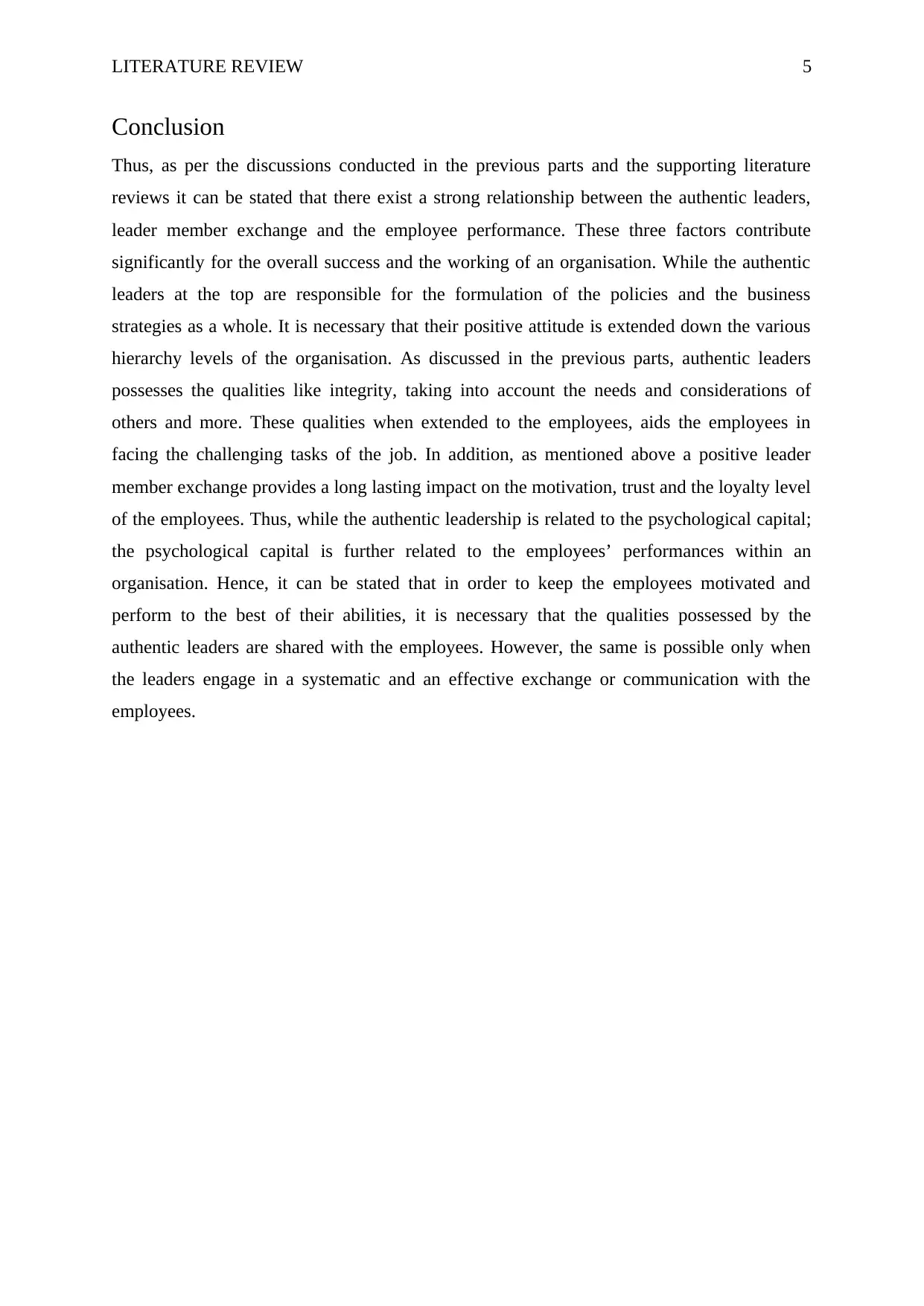
LITERATURE REVIEW 5
Conclusion
Thus, as per the discussions conducted in the previous parts and the supporting literature
reviews it can be stated that there exist a strong relationship between the authentic leaders,
leader member exchange and the employee performance. These three factors contribute
significantly for the overall success and the working of an organisation. While the authentic
leaders at the top are responsible for the formulation of the policies and the business
strategies as a whole. It is necessary that their positive attitude is extended down the various
hierarchy levels of the organisation. As discussed in the previous parts, authentic leaders
possesses the qualities like integrity, taking into account the needs and considerations of
others and more. These qualities when extended to the employees, aids the employees in
facing the challenging tasks of the job. In addition, as mentioned above a positive leader
member exchange provides a long lasting impact on the motivation, trust and the loyalty level
of the employees. Thus, while the authentic leadership is related to the psychological capital;
the psychological capital is further related to the employees’ performances within an
organisation. Hence, it can be stated that in order to keep the employees motivated and
perform to the best of their abilities, it is necessary that the qualities possessed by the
authentic leaders are shared with the employees. However, the same is possible only when
the leaders engage in a systematic and an effective exchange or communication with the
employees.
Conclusion
Thus, as per the discussions conducted in the previous parts and the supporting literature
reviews it can be stated that there exist a strong relationship between the authentic leaders,
leader member exchange and the employee performance. These three factors contribute
significantly for the overall success and the working of an organisation. While the authentic
leaders at the top are responsible for the formulation of the policies and the business
strategies as a whole. It is necessary that their positive attitude is extended down the various
hierarchy levels of the organisation. As discussed in the previous parts, authentic leaders
possesses the qualities like integrity, taking into account the needs and considerations of
others and more. These qualities when extended to the employees, aids the employees in
facing the challenging tasks of the job. In addition, as mentioned above a positive leader
member exchange provides a long lasting impact on the motivation, trust and the loyalty level
of the employees. Thus, while the authentic leadership is related to the psychological capital;
the psychological capital is further related to the employees’ performances within an
organisation. Hence, it can be stated that in order to keep the employees motivated and
perform to the best of their abilities, it is necessary that the qualities possessed by the
authentic leaders are shared with the employees. However, the same is possible only when
the leaders engage in a systematic and an effective exchange or communication with the
employees.
⊘ This is a preview!⊘
Do you want full access?
Subscribe today to unlock all pages.

Trusted by 1+ million students worldwide
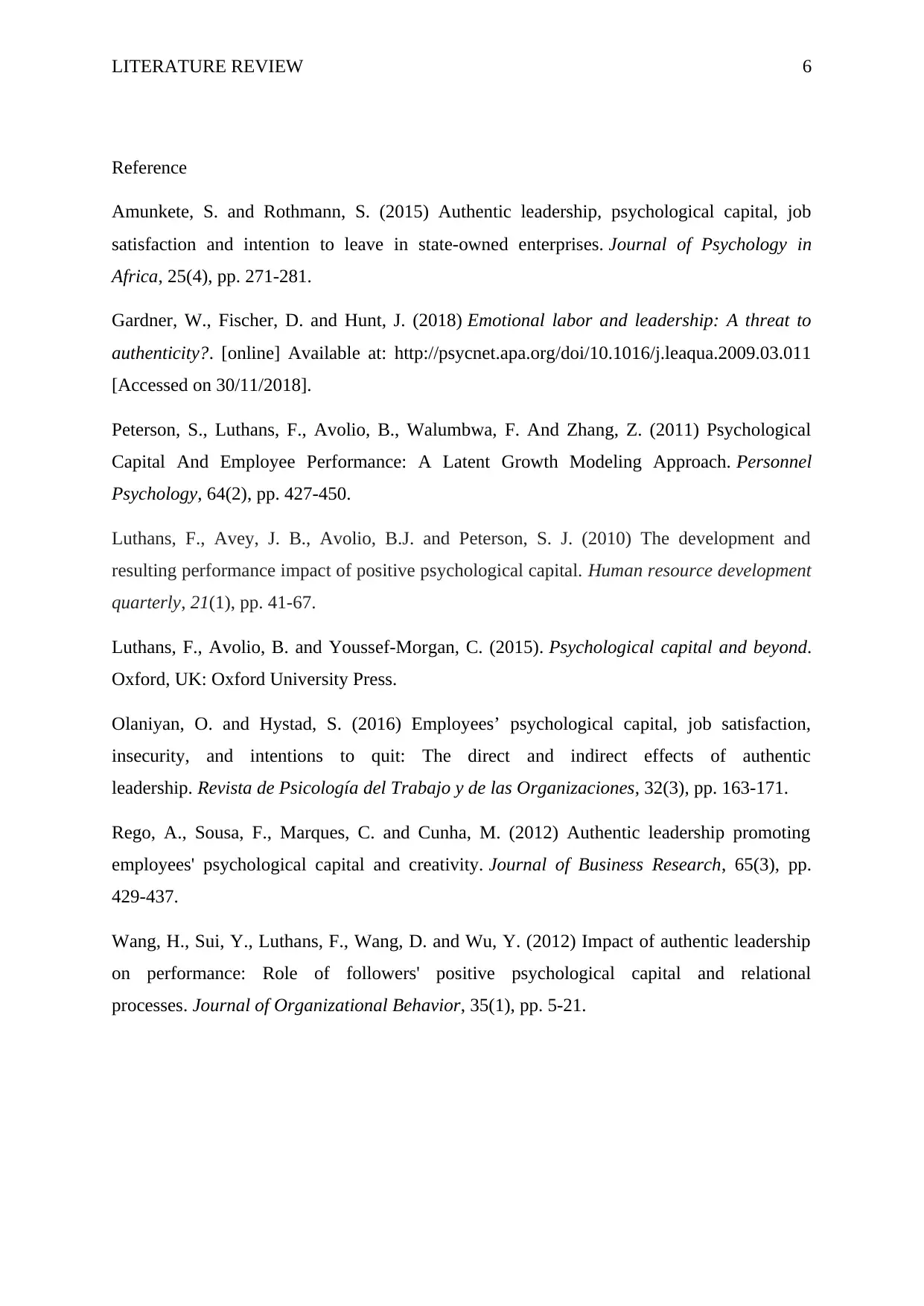
LITERATURE REVIEW 6
Reference
Amunkete, S. and Rothmann, S. (2015) Authentic leadership, psychological capital, job
satisfaction and intention to leave in state-owned enterprises. Journal of Psychology in
Africa, 25(4), pp. 271-281.
Gardner, W., Fischer, D. and Hunt, J. (2018) Emotional labor and leadership: A threat to
authenticity?. [online] Available at: http://psycnet.apa.org/doi/10.1016/j.leaqua.2009.03.011
[Accessed on 30/11/2018].
Peterson, S., Luthans, F., Avolio, B., Walumbwa, F. And Zhang, Z. (2011) Psychological
Capital And Employee Performance: A Latent Growth Modeling Approach. Personnel
Psychology, 64(2), pp. 427-450.
Luthans, F., Avey, J. B., Avolio, B.J. and Peterson, S. J. (2010) The development and
resulting performance impact of positive psychological capital. Human resource development
quarterly, 21(1), pp. 41-67.
Luthans, F., Avolio, B. and Youssef-Morgan, C. (2015). Psychological capital and beyond.
Oxford, UK: Oxford University Press.
Olaniyan, O. and Hystad, S. (2016) Employees’ psychological capital, job satisfaction,
insecurity, and intentions to quit: The direct and indirect effects of authentic
leadership. Revista de Psicología del Trabajo y de las Organizaciones, 32(3), pp. 163-171.
Rego, A., Sousa, F., Marques, C. and Cunha, M. (2012) Authentic leadership promoting
employees' psychological capital and creativity. Journal of Business Research, 65(3), pp.
429-437.
Wang, H., Sui, Y., Luthans, F., Wang, D. and Wu, Y. (2012) Impact of authentic leadership
on performance: Role of followers' positive psychological capital and relational
processes. Journal of Organizational Behavior, 35(1), pp. 5-21.
Reference
Amunkete, S. and Rothmann, S. (2015) Authentic leadership, psychological capital, job
satisfaction and intention to leave in state-owned enterprises. Journal of Psychology in
Africa, 25(4), pp. 271-281.
Gardner, W., Fischer, D. and Hunt, J. (2018) Emotional labor and leadership: A threat to
authenticity?. [online] Available at: http://psycnet.apa.org/doi/10.1016/j.leaqua.2009.03.011
[Accessed on 30/11/2018].
Peterson, S., Luthans, F., Avolio, B., Walumbwa, F. And Zhang, Z. (2011) Psychological
Capital And Employee Performance: A Latent Growth Modeling Approach. Personnel
Psychology, 64(2), pp. 427-450.
Luthans, F., Avey, J. B., Avolio, B.J. and Peterson, S. J. (2010) The development and
resulting performance impact of positive psychological capital. Human resource development
quarterly, 21(1), pp. 41-67.
Luthans, F., Avolio, B. and Youssef-Morgan, C. (2015). Psychological capital and beyond.
Oxford, UK: Oxford University Press.
Olaniyan, O. and Hystad, S. (2016) Employees’ psychological capital, job satisfaction,
insecurity, and intentions to quit: The direct and indirect effects of authentic
leadership. Revista de Psicología del Trabajo y de las Organizaciones, 32(3), pp. 163-171.
Rego, A., Sousa, F., Marques, C. and Cunha, M. (2012) Authentic leadership promoting
employees' psychological capital and creativity. Journal of Business Research, 65(3), pp.
429-437.
Wang, H., Sui, Y., Luthans, F., Wang, D. and Wu, Y. (2012) Impact of authentic leadership
on performance: Role of followers' positive psychological capital and relational
processes. Journal of Organizational Behavior, 35(1), pp. 5-21.
1 out of 7
Related Documents
Your All-in-One AI-Powered Toolkit for Academic Success.
+13062052269
info@desklib.com
Available 24*7 on WhatsApp / Email
![[object Object]](/_next/static/media/star-bottom.7253800d.svg)
Unlock your academic potential
Copyright © 2020–2026 A2Z Services. All Rights Reserved. Developed and managed by ZUCOL.





